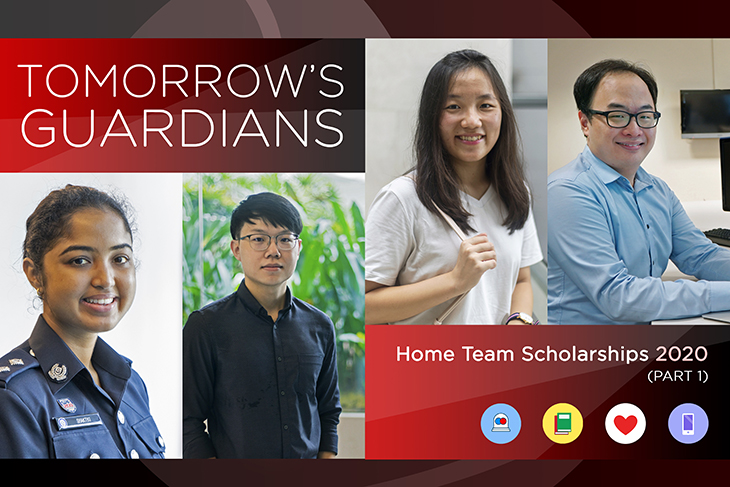
For Debra Thio, a Crime Pattern Analyst with the Police Intelligence Department (PID) of the
Singapore Police Force (SPF), teasing out actionable insights to fight crime is just part of a daily routine. The role requires Debra to make sense of intel data from different sources, to enable downstream actions like ground operations, policy formulation or community engagement.
You’d never know that the champion of PID’s 2020 Coding Challenge had zero knowledge of data analytics and coding when she first joined the team in 2019. Despite not having a quantitative background as a History graduate, being open to new challenges and having a growth mindset has helped Debra sharpen her skills and contribute to SPF’s mission of fighting crime. Let’s find out more about her “unexpected” career choice!
How did you come to join SPF as an Intelligence officer?
I studied History at
Nanyang Technological University and was looking for a career that required research, analysis and writing, as these were my interests. The PID role struck me as it would allow me to do all three, even though I don’t have a numerical background.
Also, I’d previously interned with SPF’s Public Affairs Department. I worked on a research paper about secret societies and got to learn a lot about Police work. Seeing firsthand how Home Team officers enjoyed their work and are proud of what they do, I decided to give it a shot!
What do you do as a Crime Pattern Analyst?
PID oversees the specialised field of Intelligence operations at SPF and our work involves studying crime data to find useful intelligence and insights to combat crime. As a Crime Pattern Analyst, I use analytics software and coding tools to process crime data and identify key factors and trends. These insights and observations are then shared with other SPF departments.

One of the trends that we’ve been studying is the rise in online crime. In the past, criminals were often restricted geographically in terms of who they could commit crimes against. But as online transactions increase, criminals have also moved online, with scams and other such crimes becoming more common and transnational in nature. It’s been most rewarding for me to study
how criminal activities evolve and to contribute to fighting scammers.
Share a few little-known facts about your work as an Intelligence officer.
Not all of us are uniformed officers. Civilian officers like me also play a deep role within the Intelligence domain as we work closely with uniformed officers.

Another misperception that people have about our work is that we pore over volumes of text to produce lengthy reports with lots of fancy words. In fact, as a Crime Pattern Analyst, I deal with numerical data more than words.
Finally, a big part of our job involves communicating insights to our stakeholders. We regularly have discussions with fellow officers and share our findings at workgroup meetings. So our work is very much about collaboration.
 Share with us a memorable moment from your work as a Crime Pattern Analyst.
Share with us a memorable moment from your work as a Crime Pattern Analyst.
It would have to be winning the PID Coding Challenge in 2020. I signed up with a colleague and we won first place; our project involved conducting HR analytics using test data.
What made the experience even more memorable was that neither of us had a background in coding. We were really starting from scratch and our whole process was marked by trial and error. I learnt an important lesson that applies not only to coding, but to picking up new skills in general – we have to embrace the learning curve and be brave when taking on new learning opportunities.
What are your biggest takeaways in terms of your professional development?
My work at PID has given me a great sense of accomplishment. Having a growth mindset is key; I wouldn't have expected myself to be at ease with data analytics and coding, having come from a field of studies that’s more qualitative in nature. That’s why I’m grateful that I can deepen my understanding further through a sponsorship; I’m currently studying for a Professional Diploma in Data Analytics at
Ngee Ann Polytechnic.
I’ve also learnt the importance of tenacity. You need to be strongly committed to producing quality insights and reports despite tight deadlines and other constraints.
Lastly, as Intelligence officers, we need to be able to think out of the box. Many of the crime trends that we’re seeing now are shaped by non-traditional factors. To tackle these effectively, we can’t rely on the same old strategies. New challenges will require new solutions.
What’s your advice for those considering a career as an Intelligence officer?
Come in with an open mind and seize the learning opportunities that come your way!
Guardians of Our Home
- Psychology Career Track: A Day in the Life of a Home Team Psychologist
- Intelligence Career Track: Leading with a Cause
- Internal Security Career Track: Six Qualities of an ISD Officer
- Commercial Affairs Track: On an Enforcement Operation with a Commercial Affairs Officer
- Civilian Generalist Career Track: Growing Beyond to Take on New Roles
- Science and Technology Career Track: Exploring Leading-edge Vehicle Platforms
MHA Civilian Scholarship
The
MHA Civilian Scholarship is awarded to outstanding individuals who are passionate about strengthening Singapore’s security and public safety. Recipients of the MHA Civilian Scholarship may choose from a variety of exciting and rewarding Home Team careers according to their interests and aspirations. This civilian scholarship offers six career tracks: a
Generalist track and five Specialist tracks:
Intelligence; Psychology; Commercial Affairs; Science and Technology; and
Internal Security. Applications are now open! Learn more about the
MHA Civilian Scholarships!










